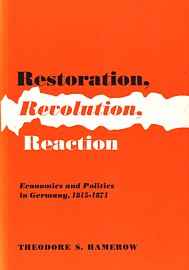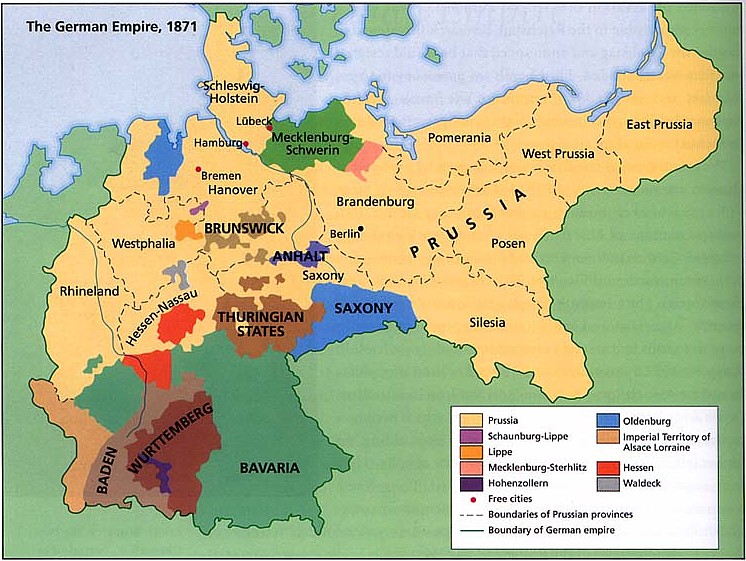Essay (back
to top)
Summary
This book focuses on a period of German history that has been studied in great detail. However, Hamerow aims to look at the social changes that were taking place in Germany during this period and link them to the changes that happened politically, rather than focus on the political side like many others have done. The book contains primary sources that had previously never been translated into English and so provides a wealth of information from contemporary journalists and statisticians.
The main argument of this text is that the liberals were the greatest advocates for national unification. Hamerow details in great lengths the industrialization that was taking place in Germany and how this changed the class structure of the nation by increasing the strength of the bourgeoisie. It also has to be noted that the liberal movement, which was pushing for unification, was largely made up of the bourgeois class and so also gained many supporters due to what was taking place within Germany. The text also deals with the link between political liberalism and economic liberalism, which is the idea of a capitalist free market, and how the changes in distribution of wealth should also lead to a change in the distribution of power.
Many of the conclusions drawn by the book are not particularly original and have been noted by other historians before. With the wealth of contemporary information that Hamerow provides, however, we do get a lot of information that leads to interesting insights. This includes sources that provide evidence that contradicts the previously held view that the Prussian primary school system was first-rate. Hamerow also makes many arguments that suggest that the masses of the German population felt that they could do nothing to change the way in which the country was being run, and so most of them remained politically inactive.
Whilst this book may not be unique in terms of the conclusions that have been formed within it, I chose to study it because of the large amounts of contemporary evidence that it provides and due to my interest in this particular period of German history. My main aim of the essay is to study what was happening in German society that led to a new push for German unification. In order to do this I will have to analyze what was happening to the economy of the nation, if and how population shifts took place and whether they gave rise to desire for unification and also how the class system of Germany was changing and the role that this played.
Thesis Statement (back to top)
The social changes that took place within Germany from 1858-1871 led to widespread popular support for the liberal movement and a unified nation, and hence were the most important factors in German unification.
Main Essay
Germany experienced many social changes between 1858 and 1871, which produced aspirations for the unification of the nation. The main group who supported a unified Germany was the liberals, who gained much support during these years. Changes within the nation, in terms of the economy, the population distribution and changes within the class system prompted support for the liberals and unification, as argued by Hamerow in The Social Foundations of German Unification 1858-1871 (1969).
The German economy had experienced a recession in 1857 which meant, “business failures, lost savings, [and] falling incomes” (Hamerow, 8) because “there was everywhere a shortage of money” (Hamerow, 8, translating Gildemeister, O. “Die Verkehrskrisis des Jahres 1857”. Preussische Jahrbücher, I P98) due to very high interest rates. The Prussian bank sought to lower its discount rate in order to encourage people to spend and so promoted the capitalist economy of this period, much like lowering an interest rate would do today. The 1860s was a decade of economic progress and led to a rise in industry in Germany. During the 1860s “pig iron production more than doubled…the manufacture of steel increased fivefold” (Hamerow, 12) and exports of both were greater than imports. The economic changes show the nation was developing from the old system to a new form of industrial capitalism.
Germany had of course been unified in terms of economics for many years through the Zollverein, or customs union. In Bismarck by Bruce Waller (1997), the author argues that due to its role in the Zollverein and its economic prosperity, “ Prussia seemed more qualified for leadership than Austria” (Waller, 78). This highlights the importance of the Zollverein to the people of Germany, as the strongest state within the customs union was seen as having more right to lead a unified Germany. Also, liberal economics had worked very well within the states, as had their economic unification and this led to more support for liberal politics and a unified nation.
This economic increase took place within a nation that was undergoing industrialization in many forms, such as the mechanization of production, and these two ideas were making Germany a more capitalist society. Many sectors of the German economy were prospering from capitalism, such as banking and agriculture, which led to other forms of change. For example, the increase in factories and mechanization left many people who used to practice trades and crafts without a job, whilst also causing “the most important population movement in Germany during the nineteenth century…from the country to the city” (Hamerow, 53-54).
This migration of the population was very important, and as was the case with the economy, it was seen as a change from the old ways to the new. The rise in urban population was “encouraging the spread of new political ideologies like liberalism” (Hamerow, 55) whilst also favoring “bourgeois forms of wealth based on manufacture and commerce” (Hamerow, 55), which was giving rise to the new bourgeoisie class. This new class was perhaps the most important social outcome of the industrial revolution as they were “small in numbers, but energetic, ambitious, dissatisfied, and above all affluent” (Hamerow, 83). The appearance of the bourgeois class caused much disruption to society and led to many changes, as the shift in distribution of wealth generated demand for changes in the distribution of power.
Social changes often bring about desires for changes to be made politically, giving support to new political ideals, and this was no exception as “the dissatisfaction with the established order [was] revealed in the growth of liberalism” (Hamerow, 84). The rise of a new wealthy class that had no political power was always likely to cause problems, and it in turn gave rise to “a class struggle…of the bourgeoisie against Junkerdom” (Hamerow, 135, translating Aus dem Leben Bernhadis, v, 7) as they fought for more power and new civic ideals. The bourgeoisie were in the majority liberals and they desired what they believed they were entitled to in terms of political influence.
The German Progress Party was established in 1861 by liberal members of the Prussian lower house. They sought the unification of Germany with central power in Prussia, whilst also wanting representative democracy. The group had the largest membership of the lower house between 1861 and 1865, showing the support for the liberals and their ideals. The liberals were split over the issue of Bismarck’s foreign policy, and in 1867 the National Liberal Party was founded, which kept the same main beliefs but agreed with Bismarck’s expansionism. From 1867 until 1871, the main aim of the National Liberals was to make the government less autocratic and give more power to the bourgeoisie, which they hoped to achieve through representative democracy. While other separate liberal parties were formed, the two mentioned previously were the most important and united many liberals in their desire for unification and representative democracy, with Prussia having central power.
The progressive liberals gained much support from the wealthy bourgeois class and from others who desired representative democracy. However, they were largely “incapable of inspiring the laboring masses” (Hamerow, 180) due to their lack of social reform, which was desired by the working class that had been created by capitalism. However, some working class people did support ideas that the liberals upheld, as they desired a unified Germany and some form of representation. The liberals also proposed that a unified Germany would improve the nation in terms of education, and that the economy and the nation as a whole would prosper even further if the country, and not just the economy, was united.
The idea of a unified Germany became much more popular during this period, and a lot of this can be attributed to the liberals. When the states unified in 1871, many of the ideals that the liberals had sought were upheld, such as a form of representative democracy and free trade. The various liberal parties had become an important group in German society and had gathered many followers due to their popular ideas. The liberals had gained support in all German states, which meant that many states were more open to the idea of unification. These shared interests made the idea of a united Germany much more popular, with a large number agreeing that it was Prussia that should have central power. The liberals gained much support for the idea of unification and made it more acceptable on a general level, providing the widespread support and similar aims that the separate states needed in order to unify.
Many historians argue that Otto von Bismarck has to be considered the most influential factor in German unification. According to Pflanze, “ Bismarck was the political surgeon who amputated nationalism from liberalism” (Pflanze, 10), and Bertrand Russell noted that “It was only through Bismarck that German patriotism became respectable” (Russell, 362). I disagree with Pflanze, as it was the National Liberal Party that was Bismarck’s main ally in the Reichstag for many years, and until 1879 he supported their free trade ideals, suggesting he was open to some liberal ideas in order to unite the nation. In response to Russell, there can be no denying that Bismarck furthered the patriotic feeling of the nation, but this had already been given a strong base by the liberals, whom I, unlike Russell, would characterize as already being respectable. Pflanze also argues that “Only under the stimulation provided by Bismarck…did German nationalism begin to move the masses” (Pflanze, 13), but once again I disagree as the social changes that had taken place had already left people calling for a unified Germany.
There can be no denying that there were many factors that led to German unification in 1871. The customs union had been established for a long time and Bismarck ’s military campaign garnered strength for the idea of nationalism. However, whilst the liberals may not have had support from the masses, the many important supporters that they had played key roles within German society and they convinced many others that a unified Germany was the only way for the country to move forward. The liberals came forward from the economically developing and industrializing nation and wanted to make sure they had a political voice. The bourgeois class developed out of the capitalist society that was radically modernizing during this period, and gave support to the idea of unification and a form of political democracy. Many German states became amenable to the idea of a unified Germany , due to the influence of the liberals, and this allowed Bismarck to unite the nation under the power of Prussia , again an idea advocated by liberals. While it took a figure like Bismarck to unite the nation, I believe he would have been unable to do so if the social events between 1858 and 1871 had not given rise to the bourgeois class and the liberals, who provided the foundations for the idea of German unification. |
 a different book by Hamerow
a different book by Hamerow
